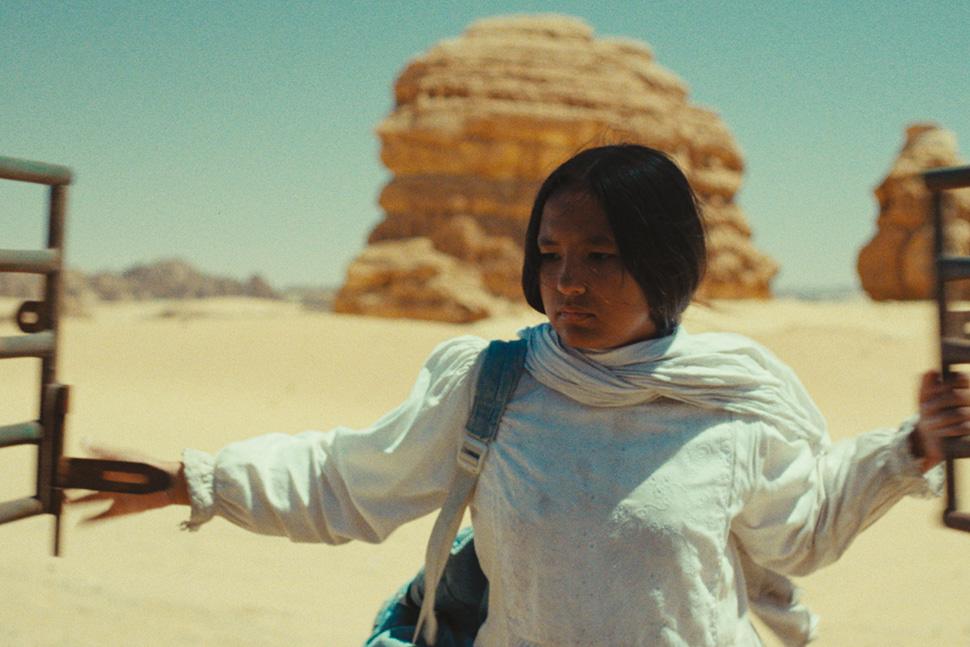Hijra
Hijra
VERDICT: Three women's journey to Mecca becomes a stunning allegory on life for a 12-year-old girl in Saudi director Shahad Ameen’s (‘Scales’) bewitching road movie, ‘Hijra’.
From the dusty opening bus ride taken by two rebellious teenage sisters and their elderly granny, whose dream is to visit Mecca and perform the Hajj, to the single survivor observing a camel disappear across the desert, Hijra ascends from level to level as its journey progresses, reaching high into the sky with a spiritual dimension that doesn’t feel forced. Using faces and landscapes, coupled with naturalistic performances from a perfectly chosen small cast, Saudi director Shahad Ameen offers a penetrating, multifaceted portrait of women caught up in Arab culture without resorting to any of the usual narrative clichés. The Saudi-Iraqi-UK-Egyptian coprod should get a lot of festival visibility after its bow in Venice’s Spotlight sidebar, the same festival that launched the career of another famous Saudi title, Haifaa al-Mansour’s Wadjda, in 2012.
One can see how Hijra developed out of Ameen’s first feature, the 2019 Scales, which was set on a remote island where fishermen sacrifice their daughters to the sea to ensure a bountiful catch. Here the mythic dimension is present but muted, deepening the storyline.
On the bus ride (it is hot, crowded and all-women), the pilgrims get off to pray at a miqat, a boundary area approaching Mecca. Suddenly Janna, who is 12 and addicted to listening to music over headphones, can’t find her older sister Sara in the pressing crowd. She raises the alarm with grandmother Sitti and from that moment on the story accelerates with the tension of a thriller, as the search for the mssing girl commences.
First surprise: Sitti is not so surprised. She sternly faces Janna and demands to know where Sara is. Janna hesitates, but finally blurts out “Aunt Laila”. This is their first clue and Sitti, a woman of few words and ironclad determination, launches them on the trail of the missing girl.
Commandeering the boisterous but good-hearted Ahmed (Nawaf Al Dhufairi), who sells fake holy water out of a ramshackle truck, Sitti pays him handsomely to drive them to Jeddah. There the glamorous Aunt Laila, who appears to own a beauty parlor, is forced to tell them the worst: Sara has run away to join a young man. With a scribbled address in hand, Sitti drags Janna, along with her folding chair, the girl’s bulky backpack and a large black trolley, back on the trail. As usual, Ahmed stops grumbling as the cash comes out of granny’s wallet.
Though it sounds like material for a comedy, Ameen’s screenplay sticks to the dramatic side of things, adding urgency with the news that Sara is trying to leave the country to find freedom in Egypt. As Janna begins to see the world through more mature eyes, and Sitti opens up to her about her own childhood immigration to Saudi, the two women separated by generations start to bond deeply. The stubbornness of their character mirrors itself in the other and they discover their goals – first to find and then to liberate Sara – are the same. The two actresses — Khairia Nazmi and the young Lamar Feddan — have very different but complementary intensities that draw the viewer into their expressive faces.
The story moves at a fast clip through many encounters and twists, expertly edited by Hervé de Luze and Mohamed Jabarah Al-Daradji (the latter also a coproducer.) The cinematography by Miguel I. Littin-Menz is highly layered, the characters often almost obscured by dust or rain or snow, and the camerawork exalts Saudi’s desert locations to the max, with sheer cliffs plunging into beaches and mountains of rock rising out of the sand to rival Monument Valley.
Beyond its strong narrative structure, the film projects other dimensions and subtler meanings. The title Hijra, which means migration in Arabic, is also used to refer to the Prophet Muhammad’s emigration to the city of Medina in 622, and reminds us that the women’s interrupted pilgrimage is always there in the background and certainly on Sitti’s mind. Apart from the noise of the black-robed local harpies who won’t let Sitti visit her father’s grave because women are not allowed in cemeteries, or the terrible reaction of Sara’s father when he learns she has run away, the film incorporates Islam’s spirituality into its characters to great effect.
Director, screenplay: Shahad Ameen
Cast: Lamar Faden, Khairiah Nathmy, Nawaf Al-Dhufairy
Cinematography: Miguel I. Littin-Menz
Editing: Hervé de Luze, Mohamed Jabarah Al-Daradji
Production design: Chris Richmond, Ali Saad
Costume design: Meznah Alharbi
Music: Armand Amar
Sound: Roland Vajs
Production companies: Bite Ameen (Mohamed Jabarah Al-Daradji), Iraqi Independent Film Center (Mohamed Jabarah Al-Daradji), Ideation Studios (Faisal Baltyuor, Ayman Jamal, Mohammed Alawi), Film Clinic (Mohamed Hefzy), Human Film (Ali Atia Jabarah Al-Daradji), Daw Film – Film Commission | MOC (Abdullah Naser Al-Qahtani), Noon Art Media Production (Ahmed Al-Mulla), Three Arts (Abboud Ayyach)
Venue: Venice Film Festival (Spotlight )
In Arabic, Urdu, Turkish, English
115 minutes

